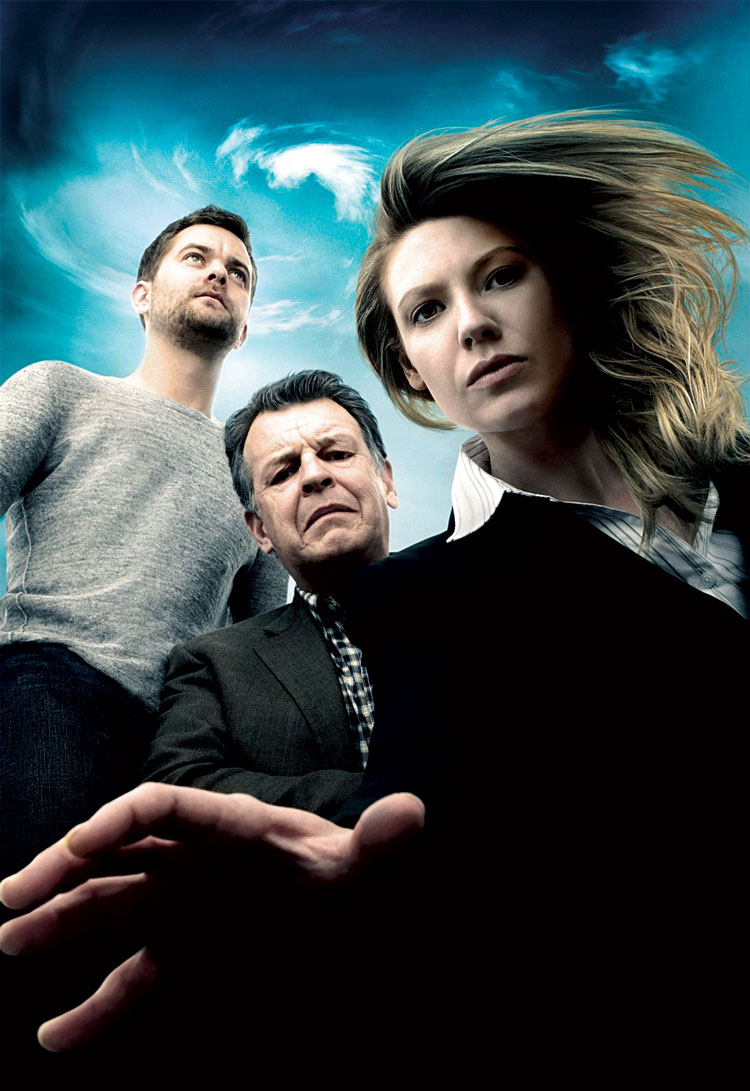Somewhere out there in the multiverse, there’s a world in which Fringe won the audience it deserved. In our version of reality, however, those of us who cherished this mesmerising, mind-bending show – a link in the chain of unforgettable science-fiction offerings that connects The Twilight Zone to Kolchak: The Night Stalker and The X-Files – are left with tantalising echoes of all that might have been.
Like a number of its forebears, it was cursed with poor ratings and an untimely end, yet Fringe succeeded on multiple levels. Bold, boundary-breaking and often brilliant, its five seasons (2008–2013) whirled from one high-concept premise to another, anchoring its flights of sci-fi fancy in emotional depth with as much skill as the best examples of its genre.
FBI agent Olivia Dunham (Anna Torv) finds herself embroiled in a succession of mind-bending, grisly cases as she’s drawn further and further into a whirlpool of weirdness with mismatched father-and-son team Walter and Peter Bishop (John Noble and Joshua Jackson). Aided by wise and witty Astrid Farnsworth (Jasika Nicole), their stern superior Phillip Broyles (Lance Reddick), and thoughtful colleague Charlie Francis (Kirk Acevedo), Olivia’s quest for answers sees her regularly cross swords with the mysterious Nina Sharp (Blair Brown), COO of deeply dodgy biotechnology firm, Massive Dynamic. The newly formed Fringe Division is forced to contend with sinister forces, deadly creatures, and mentally-altered scientist Walter’s tendency to wander off, spiritually and otherwise, at inopportune moments. And that’s all before they meet their alternate selves…
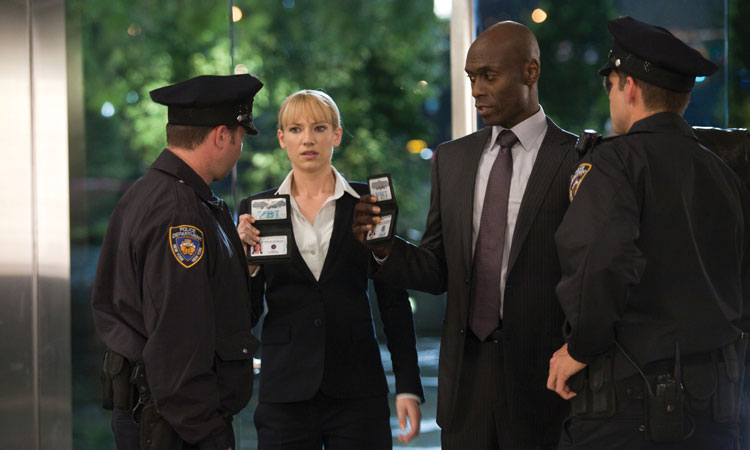
Writer Noel Murray reviewed the series for The A V Club throughout its run and remains a fan. He sets Fringe’s development within the context of the televisual landscape of 2008: “Fringe arrived under the long shadow of Lost, a show that, as great as it was, I think had a mostly negative influence on genre TV, which carried over for years after it ended.” J J Abrams, who co-created Fringe with Roberto Orci and Alex Kurtzman, had in fact been one of the minds behind Lost.
“The idea [of Fringe] was to combine the long-form mysteries of Lost with old-fashioned ‘monster of the week’ episodic storytelling, which viewers could drop into and out of without getting too confused,” Murray continues. “As it turned out, Fringe went from being a good show to a great one once it became more serialised. But that happened naturally, which made a huge difference.”
Murray’s view of the show’s appeal, and its more obvious influences, will resonate with many long-time fans. “As a comic book reader who grew up in the Seventies and Eighties, I remember getting especially excited about the show once I realised the writers were going in hard on the multiverse concept. Other shows have explored this idea since, including Counterpart, The Flash and Star Trek: Discovery. In the latter two cases, those writers have been drawing on the same specific source material that inspired Fringe: DC Comics and Star Trek’s Mirror Universe. But the level of specific detail in Fringe’s alternate Earth reminded me of the awe I felt when I first read the ‘Crisis On Earth X!’ stories from DC as a kid… And the Observers? A total rip-off of the Watcher from Fantastic Four comics. But in a good way.”
The Observers – hairless, emotionless, besuited men whose origins and purpose remained a mystery until the devastating reveal of their dark plans for humanity’s future – were a crucial element of Fringe’s lore. In the beginning, though, there was just one: the man known only as ‘September’. Actor Michael Cerveris played this iconic role superbly, bringing mystery and, eventually, pathos to this strange, beguiling figure. It’s an achievement all the more impressive given that September’s path wasn’t made completely clear to Cerveris from the start, though he did get to determine September’s look – complete with the distinctive fedora hat – and his demeanour. “The head tilt came from my dog, when she’s listening to you and she hears a word that she recognises, like ‘food’ or ‘walk’. I actually based a lot of the character, physically, on my dog, because it seemed like a similar alien creature in a world in which it’s very curious about these other creatures but not entirely clear about why they do the things they do, and that seemed to be very much what September’s position was in the world. I loved it when, in the fifth season, they went back and gave a reason why September did that: animals do it, shifting their head and changing where their ears are, and there’s an audiological reason to do that, in picking up different frequencies.
“I would have a phone call at the beginning of each season in which they would lay out the roadmap for that season in broad strokes,” Cerveris continues. “I do remember having conversations with them early on when they’d say, ‘I know it seems like you’re in and out and sometimes we use the character a lot, sometimes we don’t, but he’s going to be integral to the arc of the whole show, and he’s going to have a crucial role in the overall story’. I believed them when they said that to a certain extent, but it’s the kind of thing producers and creators often say to keep you enthusiastic about a job, and then don’t actually deliver on!” he says, laughing. “So I was cautiously optimistic.”
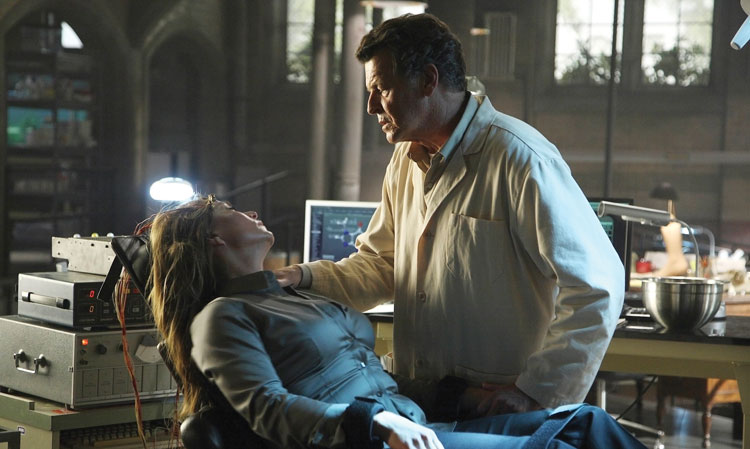
As time passed, the truth behind September’s origins started to take shape. “Each season, it would be clear that something important was happening with him, and they would give me some indication, but I think it was a combination of them wanting to keep the secret and make sure information didn’t get out, and then also not being certain exactly where they were going. I think they would come to the end of a season and take stock of what they had done, and especially going into the fifth season, I remember them telling me that they had gone back and rewatched everything in order to remind themselves of what they had done before they wrote the last season. They knew, essentially, where they were going to go, but how they were going to get there was very much developed as they went along. I was a big X-Files fan, and I remember thinking with that, did they know in the pilot what the map was going to be in the next seven years? And on the basis of Fringe, I would say, no, they didn’t, they just kind of invented it as they went along to some extent! So I was equally surprised and thrilled when I discovered that, ultimately, September was going to save the universe.”
Cerveris had the interesting task of ‘training’ September’s new Observer colleagues in Season Two, as we learnt to our – and Fringe Division’s – shock that he wasn’t actually alone. “It was great fun for me, because after spending years feeling like the only one of my kind, and not having anyone else to talk to, there were others playing other Observers! I guess it began with the episode with August (played by Peter Woodward). We had a really great relationship, as at that stage it was pretty much just the two of us. The most amusing thing to me was that they were given a DVD with selected September scenes from the earlier seasons to give them a sense of what the speaking cadence was and what the gestural language was for the character, so they were basically doing a version of me. So it was really funny to sit at a table and watch someone doing an impression of me!”
Screenwriter Zack Stentz – along with his then writing partner, Ashley Edward Miller – worked on that thrilling, lore-driven second season, which presented a number of creative challenges. “At the beginning of the second season, some aspects of the initial lore were beginning to be walked away from (so long, ‘the pattern’) while others were just beginning to come into focus (hello, ‘the other side’),” Stentz tells us. “The Observers existed, but no one had decided what they actually were yet, and the nature of the conflict between the two universes hadn’t really come into focus yet. Anna Torv was also wavering in her commitment to the show, which was why the short-lived character of Jessup was brought in (the future Duchess of Sussex, Meghan Markle) as a possible replacement. Basically, a lot of things were in flux at the beginning of the season.
“Because Ash and I tended to think like science fiction writers in our approach towards world-building, we seemed to keep getting the mythology episodes. Fringe was an unusual situation in that there wasn’t really a continuously active writers’ room grinding out arcs and episodes, but ad hoc groups of writers pulled in by [co-showrunners] Jeff Pinkner and Joel Wyman to do the episodes one at a time. Several of the episodes also ended up being group-written, often by writers who didn’t get credit on the final product. I ended up writing two acts of the episode ‘August’, for example. The process seemed to be quite chaotic at times, but the end result certainly made a lot of people happy!”
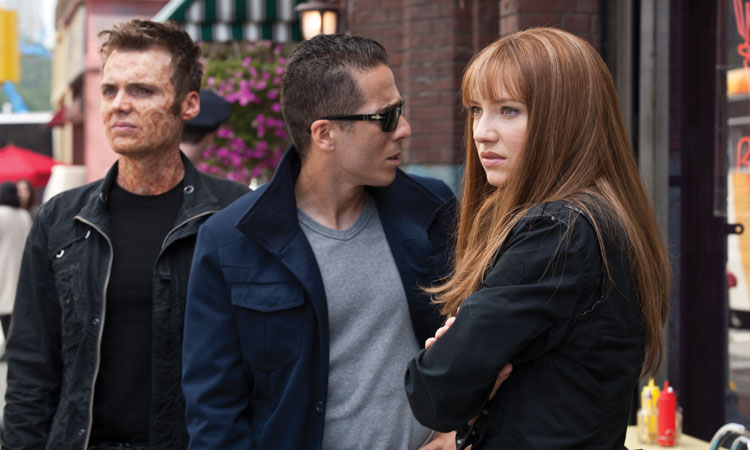
One astonishing second-season twist marks a key point in Fringe history, taking John Noble’s extraordinary acting skills to new levels as he got to portray a coolly intimidating, alternate-universe version of the shambolic scientist we’d come to love. Stentz and Miller played their part in that development. “’Walternate’ as our big bad was something Ash pitched out in the room (using that name!) part way through the season,” Stentz reveals.
Fans grew to love many of the rich and complex relationships that developed between Fringe’s characters, from Olivia’s tentative romance with Peter to Walter’s irritable but loving partnership with Astrid, whose patience with a man barely capable of getting her name right (‘Astro’, ‘Astrif’, ‘Ostrich’…) brought her close to sainthood. Frankly, Walter’s bond with his beloved milk cow, Gene, was richer than many pairings in other series. Stentz, however, is quick to identify the relationship he enjoyed writing the most. Like many viewers, he savoured the fraught, evolving bond between the lost father and the wayward son, whose struggle to reconnect with each other after numerous blows lay at the heart of many of Fringe’s most memorable episodes. “I always loved writing for the Walter-Peter relationship. A son parenting his once-formidable father is inherently interesting to write.”
Noel Murray identifies Anna Torv’s increasingly layered performance as a highlight of later seasons, pointing out that “the introduction of ‘Fauxlivia’ — and then the other Olivia variations later on — allowed her to be more playful with the character, which was a huge factor in Fringe’s improvement after Season One. I also can’t say enough good things about John Noble, who gave so many different shades to Walter — kooky, arrogant, devious, heartbroken — while making sure they were all essentially the same person. As for guest stars, it’s hard not to stand in awe of Leonard Nimoy, who helped give the show more geek cred. But as a longtime Kevin Corrigan fan, I always looked forward to episodes featuring bowling guru Sam Weiss.”
Michael Cerveris remembers his time working with John Noble with particular affection. “Everything Walter is, is true of John as well. He’s very funny, with a devilish sense of humour, but he’s very dedicated and extremely prepared; very interested in discovering things in the moment. There’s a real exchange of ideas. He’ll respond to things that you’re doing and change what he’s doing on the basis of what he’s getting from you. That isn’t always the case – you often work with actors who come in knowing exactly what they’re going to do, and it has nothing to do with you. John is not like that at all. He’s very much a partner when you’re working. It felt like we were working on Shakespeare every day. It just happened to not rhyme so much.”
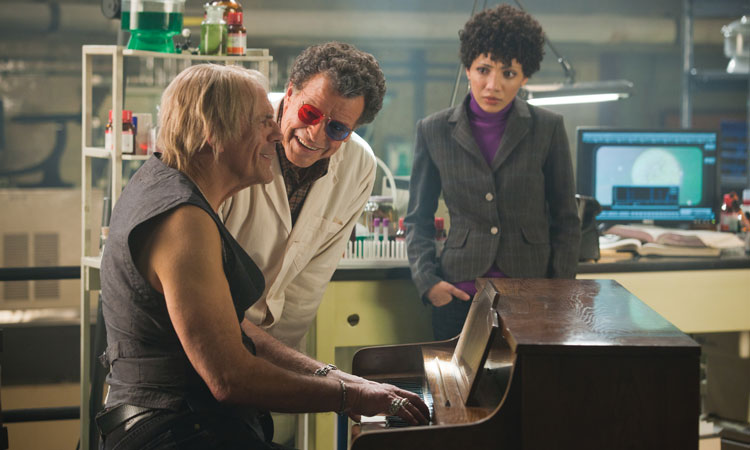
He remains in awe of the sheer range required of the main cast as they portrayed multiple different versions of their roles. “Sci-fi never gets acknowledged at the awards, but it baffled me that [the cast] weren’t nominated for their performances, especially when they were playing two extremely different characters. Those things, as an actor, really impressed me.”
It was a challenge he faced himself in Season Five when playing a very different, warmer September, now known as Donald, and who was, as Cerveris emphasises, essentially a new character. “It was so much fun for me as an actor to, you know, have hair,” he says, laughing, “and to speak a little more normally, but to try to retain aspects of the September we’d known all along so it wasn’t just a jarring, unbelievable thing.”
Fringe teetered on the brink of cancellation following its fourth season, spared only after impressively organised campaigning by the fan community, as a result of which its network, Fox, granted it an all-too-brief fifth season. Cerveris notes that working on it was a very different experience. “It felt like it was one 13-episode film, unlike the previous seasons that would have what they called the ‘monster of the week’ episodes. The final season was one long, coherent narrative from episode-to-episode and was much more focused and much more constrained in terms of its scope, but that meant that the elements in it had much greater weight, and there were lots of references in it to previous seasons and previous times. I think it was a bittersweet experience because it was a lot of fun and very exciting, but you were also aware that each step you took along the road, you were another step closer to the end of this thing. It had been so much a part of all of our lives that we were all so invested in… I would be doing it still, if it was there to be done.”
Noel Murray is as bemused as anyone by Fringe’s failure to capture the audience it deserved at the time. “For years after the show ended, I’d see people on Twitter who’d just started watching it and would talk about becoming instantly obsessed, while wondering why it flew so far under the radar during its run. It’s rare for a science-fiction series with such well-drawn characters, complex plot-arcs and creative approaches to episodic storytelling to run for five years without becoming a phenomenon.”
It seems fitting to leave the last word on the show’s qualities to the man whose character calmly observed Fringe Division’s activities for so long. Michael Cerveris describes September’s arc as defining “what it means to be human and to care about somebody else and to sacrifice for somebody else, which, ultimately, was at the heart of what the show was really about. I think it’s why it still resides so powerfully with people, because those
are things that are hard to come by, these days especially.”
Fringe is available from Warner Home Video.
